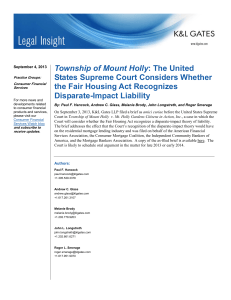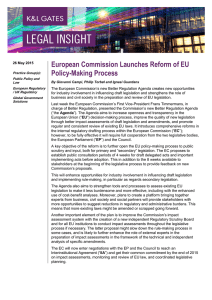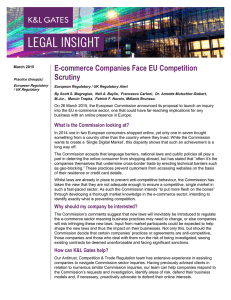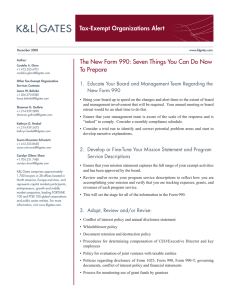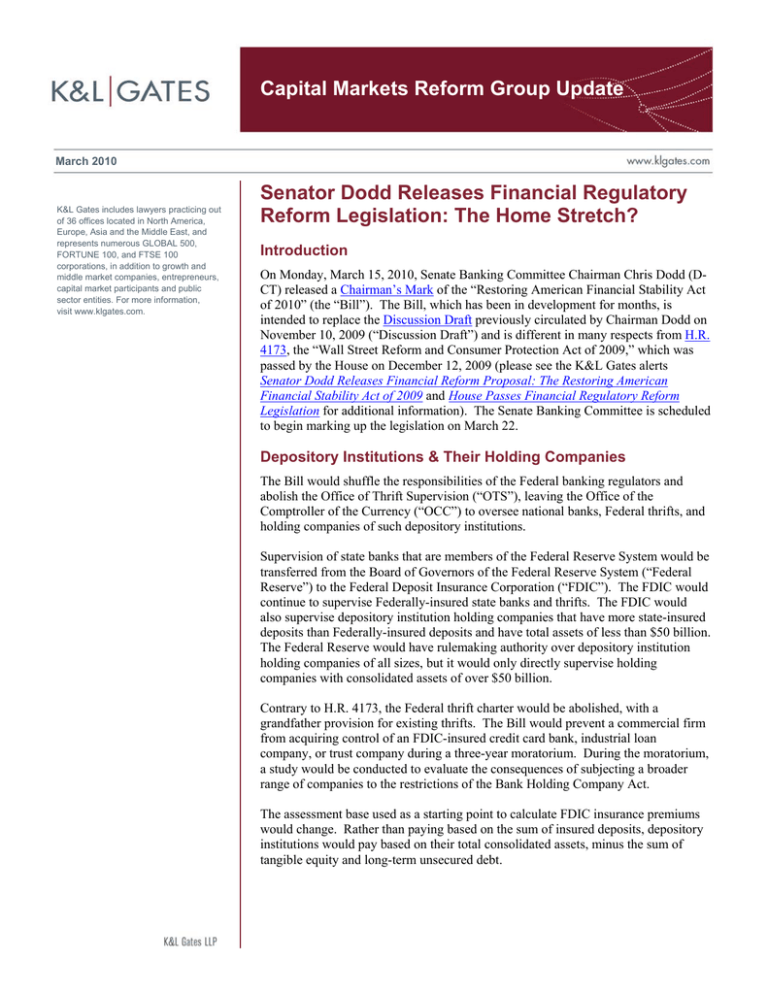
Capital Markets Reform Group Update
March 2010
K&L Gates includes lawyers practicing out
of 36 offices located in North America,
Europe, Asia and the Middle East, and
represents numerous GLOBAL 500,
FORTUNE 100, and FTSE 100
corporations, in addition to growth and
middle market companies, entrepreneurs,
capital market participants and public
sector entities. For more information,
visit www.klgates.com.
Senator Dodd Releases Financial Regulatory
Reform Legislation: The Home Stretch?
Introduction
On Monday, March 15, 2010, Senate Banking Committee Chairman Chris Dodd (DCT) released a Chairman’s Mark of the “Restoring American Financial Stability Act
of 2010” (the “Bill”). The Bill, which has been in development for months, is
intended to replace the Discussion Draft previously circulated by Chairman Dodd on
November 10, 2009 (“Discussion Draft”) and is different in many respects from H.R.
4173, the “Wall Street Reform and Consumer Protection Act of 2009,” which was
passed by the House on December 12, 2009 (please see the K&L Gates alerts
Senator Dodd Releases Financial Reform Proposal: The Restoring American
Financial Stability Act of 2009 and House Passes Financial Regulatory Reform
Legislation for additional information). The Senate Banking Committee is scheduled
to begin marking up the legislation on March 22.
Depository Institutions & Their Holding Companies
The Bill would shuffle the responsibilities of the Federal banking regulators and
abolish the Office of Thrift Supervision (“OTS”), leaving the Office of the
Comptroller of the Currency (“OCC”) to oversee national banks, Federal thrifts, and
holding companies of such depository institutions.
Supervision of state banks that are members of the Federal Reserve System would be
transferred from the Board of Governors of the Federal Reserve System (“Federal
Reserve”) to the Federal Deposit Insurance Corporation (“FDIC”). The FDIC would
continue to supervise Federally-insured state banks and thrifts. The FDIC would
also supervise depository institution holding companies that have more state-insured
deposits than Federally-insured deposits and have total assets of less than $50 billion.
The Federal Reserve would have rulemaking authority over depository institution
holding companies of all sizes, but it would only directly supervise holding
companies with consolidated assets of over $50 billion.
Contrary to H.R. 4173, the Federal thrift charter would be abolished, with a
grandfather provision for existing thrifts. The Bill would prevent a commercial firm
from acquiring control of an FDIC-insured credit card bank, industrial loan
company, or trust company during a three-year moratorium. During the moratorium,
a study would be conducted to evaluate the consequences of subjecting a broader
range of companies to the restrictions of the Bank Holding Company Act.
The assessment base used as a starting point to calculate FDIC insurance premiums
would change. Rather than paying based on the sum of insured deposits, depository
institutions would pay based on their total consolidated assets, minus the sum of
tangible equity and long-term unsecured debt.
Capital Markets Reform Group Update
Among many increased restrictions that would apply
to bank holding companies, the Bill most notably
includes a version of the Volcker Rule, which would
direct the Federal banking regulators to issue rules
prohibiting depository institutions and their holding
companies from engaging in proprietary trading and
from sponsoring or investing in hedge funds or
private equity funds. The Volcker Rule would also
direct the Federal banking regulators to impose
additional capital requirements and quantitative
limits on nonbank financial companies deemed
systemically significant and prevent companies from
merging if the resulting company’s liabilities would
exceed 10% of the aggregate consolidated liabilities
of all financial companies.
Systemic Risk
The Bill would create a Financial Stability Oversight
Council (“FSOC”), similar to the one established in
H.R. 4173, charged with identifying and monitoring
systemic risks to the nation’s financial markets. The
nine-member FSOC could require, by a two-thirds,
that nonbank financial companies posing a systemic
risk to the country’s financial stability be placed
under the Federal Reserve’s supervision.
Under the Bill’s provisions, nonbank financial
institutions designated as systemically significant by
the FSOC and bank holding companies with assets
in excess of $50 billion would be regulated by the
Federal Reserve. The Bill would mandate that the
Federal Reserve impose more stringent prudential
standards and reporting and disclosure requirements
upon the designated entities.
The Bill requires large bank holding companies and
systemically significant nonbank financial
companies to periodically submit plans for their
“rapid and orderly resolution.” If the Federal
Reserve determines a financial institution poses a
“grave threat” to the financial system, the Federal
Reserve may, upon an affirmative two-thirds vote of
the FSOC, require the company to stop engaging in
an activity or to sell some of its assets.
Liquidation Authority
The Chairman’s Mark would also establish a
Liquidation Authority. Under the provisions, the
Treasury Department, FDIC, and Federal Reserve
would have the authority, with 2/3 votes of both the
Federal Reserve and the FDIC, to appoint the FDIC
as a receiver for a financial company that is in
danger of default and such default would have a
systemically significant impact. The Bill would
establish an Orderly Liquidation Authority Panel in
the U.S. Bankruptcy Court for the District of
Delaware, a three-member panel, which would rule
on the recommendation within 24 hours.
The bill would also create an Orderly Liquidation
Fund to fund future liquidations. The fund size
would be $50 billion and would be pre-funded
through assessments on bank holding companies
with consolidated assets over $50 billion and on
nonbank financial companies supervised by the
Federal Reserve. The Bill allows the FDIC to
borrow from the Treasury Department in the case
working capital is needed. Any shortfalls are to be
covered through assessments on bank holding
companies with consolidated assets over $50
billion, nonbank financial companies supervised by
the Federal Reserve, and other financial companies
with consolidated assets over $50 billion.
Consumer Financial Protection
Bureau
The Bill would establish the Consumer Financial
Protection Bureau (“Bureau”) within the Federal
Reserve System. The Bureau would have broad
rulemaking authority for consumer protections
regarding financial products and services offered by
both banks and non-banks. The Bureau would be
granted some discretion, as the Bill provides the
Bureau with the authority to define covered
financial products and services, while at the same
time having the authority to exempt entities or
financial products and services. However, the
FSOC would have the ability to review and set aside
Bureau rules by a two-thirds vote.
The Bill would also provide the Bureau with
consumer protection supervision, examination, and
enforcement powers over banks and credit unions
with assets over $10 billion and businesses that
originate, broker, or service mortgage loans. A
bank or credit union with assets of $10 billion or
less would be examined by its Federal regulator.
The Bill specifically exempts certain entities and
activities from the purview of the Bureau.
March 2010
2
Capital Markets Reform Group Update
On the issue of preemption, states would be allowed
to adopt more stringent consumer protections than
those adopted by the Bureau. The Bill, however,
would provide the OCC with the authority to
preempt if it determines that a state law would
significantly interfere with a Federally regulated
institution’s ability to engage in banking.
Importantly, the OCC would only be able to make
such determinations on an ad hoc basis; it could not
issue blanket preemption determinations. Specific
procedures for challenging or upholding any such
determinations are included in the Bill.
OTC Derivatives
The treatment of over-the-counter derivatives in the
Bill largely tracks the Discussion Draft and H.R.
4173. An amendment in the nature of a substitute
will likely be offered by Senators Jack Reed (D-RI)
and Judd Gregg (R-NH) during the Senate Banking
Committee markup of the legislation. The Bill
differs from H.R. 4173 in that the Bill would:
•
Exclude from the swap definition any sale of a
nonfinancial commodity or any security, if such
transaction is physically settled, while H.R.
4173 provides an exclusion as long as such
transaction is intended to be physically settled;
•
Define a “major swap participant” in part based
upon a failure to perform that causes significant
credit losses to counterparties, while H.R. 4173
looks to substantial net counterparty exposure
that could adversely affect financial stability;
•
Preserve Section 2(g) of the Commodity
Exchange Act, one of the principal provisions
added in 2000 to permit the off-exchange
trading of derivatives, although a separate
exemption appears to be necessary to avoid
being required to clear such a transaction;
•
Define “alternative swap execution facility” as
an electronic trading system (rather than a
“person or entity”) with pre-trade and post-trade
transparency in which multiple participants
have the ability to execute or trade swaps by
accepting bids and offers made by other
participants that are open to multiple
participants in the system, but which is not an
exchange; and
•
Not limit the ownership ability of financial
holding companies with respect to acquiring
ownership directly or indirectly in a derivatives
clearinghouse. H.R. 4173 prohibited this if,
after the transaction, the financial holding
company would hold more than 20% ownership
in the derivatives clearinghouse.
Private Funds
The Bill would require investment advisers to hedge
funds and other private funds to register with the
Securities and Exchange Commission (“SEC”).
Private funds are broadly defined to include nonU.S. domiciled funds without regard to percentage
of securities held by U.S. persons. Exempt from
SEC registration would be investment advisers to
small business investment companies, venture
capital funds (to be defined), and private equity
funds (to be defined); private equity fund advisers
would still be subject to recordkeeping and reporting
requirements. “Family offices” would also be
excluded from the definition of “investment
adviser,” and a narrow exemption would apply to
non-U.S. domiciled advisers.
The Bill would also: (1) not subject business
development companies to the assets under
management threshold for SEC registration, (2) raise
the SEC investment adviser registration threshold to
$100 million, and (3) require investment advisers to
take steps to safeguard client assets, including
verification of such assets by an independent public
accountant. Records and reports are required to be
maintained and are subject to inspection by the SEC.
The SEC would be able to obtain information from
advisers regarding the identity, investments, or
affairs of any client for purposes of assessing
systemic risk. The Bill would require that records
and reports include types of assets held, side
arrangements or side letters, and other information
that the SEC, in consultation with the FSOC,
determines are necessary and appropriate in the
public interest and for the protection of the investor.
Investor Protection
The Bill contains an assortment of provisions
designed to protect investors and enhance
enforcement by the SEC. The SEC Chairman
March 2010
3
Capital Markets Reform Group Update
would appoint an Investor Advocate, who would
lead a committee of investors that would “advise and
consult with” the SEC. The SEC would conduct
studies on financial literacy and mutual fund
advertising and would be empowered to write
regulations to set aside mandatory pre-dispute
arbitration clauses in agreements between customers
and brokers, dealers, and municipal securities
dealers.
The Bill would not impose on broker-dealers
fiduciary duties to their customers, but the SEC
would conduct a study on the impact of such a
requirement. As under H.R. 4173, whistleblowers
could receive cash rewards and the SEC would be
authorized to bar individuals from the entire
securities industry after misconduct in one segment
of the industry.
Structural reforms at the SEC would include: (1)
granting the SEC power over its own budget and
fees; (2) adding staffs of compliance examiners to
the Divisions of Investment Management and
Trading and Markets; and (3) mandating a series of
regular reports to Congress.
The Bill would also expand the authority of the
Public Company Accounting Oversight Board
(“PCAOB”) to include auditors of registered brokerdealers. The PCAOB would also be authorized to
share information with foreign auditor oversight
authorities.
Municipal Securities
The Bill would make wholesale changes to the
municipal securities regulatory regime. The changes
include:
•
Requiring that the Municipal Securities
Rulemaking Board (“MSRB”) establish rules for
financial advisers, swap advisers, and
investment brokers;
•
Giving investors and public representatives a
majority on the MSRB;
•
Requiring the MSRB to serve as a repository of
information from municipal market participants
required by the Federal financial regulator or
self-regulatory organization;
•
Dividing equally between the SEC and the
MSRB fines collected by the SEC or its
designee for rules violations;
•
Requiring a registered securities association to
account for fines related to rules violations
separately from other fines collected, and to
allocate the fines between the regulatory
securities association and the MSRB at the
direction of the SEC; and
•
Requiring the registered securities association
to request guidance from the MSRB and
provide information to the MSRB about
enforcement actions and examinations of the
registered securities association.
Securitization
The Bill’s securitization provisions would require
the OCC, FDIC, and SEC to jointly prescribe
regulations requiring risk retention by securitizers of
asset-backed securities (“ABSs”). The regulations
would have to require that a securitizer generally
retain not less than 5% of the credit risk for any
securitized asset that is transferred, sold, or
conveyed through issuance of an ABS, which risk
may not be directly or indirectly hedged. The
regulations could provide a total or partial
exemption of any securitization “as may be
appropriate in the public interest or for the
protection of investors.” The rules would also be
required to establish the allocation of risk retention
between the securitizer and originators, with
separate rules associated with different classes of
underlying assets.
The Bill’s securitization provisions would change
disclosure and periodic reporting, including the
disclosure of due diligence of underlying assets and
of contingent repurchase obligations. Of particular
significance, the Bill would eliminate for ABSs the
ability of issuers or depositors to suspend reporting
obligations under the Securities Exchange Act of
1934, which would increase the risk of ABS
sponsors becoming ineligible to use shelf
registration statements for certain ABSs. The Bill
also would eliminate the exemption from
registration for mortgage obligations, which would
likely reduce unregistered offerings of ABSs backed
by mortgage-related assets.
March 2010
4
Capital Markets Reform Group Update
Credit Rating Agencies
The Bill proposes to enhance oversight of credit
rating agencies (“CRAs”) by establishing a new
Office of Credit Ratings, housed within the SEC. As
a condition of being registered with and recognized
by the SEC, Nationally Recognized Statistical
Ratings Organizations (“NRSROs”) would be
required to establish, maintain, and enforce written
policies and procedures to use universal rating
symbols. The Bill would also require NRSROs to
consider credible information from sources other
than the issuer and to disclose their methodologies,
use of third parties for due diligence efforts, and
ratings track record.
The SEC would be required to examine NRSROs
once a year and would have the authority to fine and
de-register agencies for providing bad ratings over
time. In addition, the Discussion Draft would
provide investors with a private right of action
against CRAs for a knowing or reckless failure to
conduct a reasonable investigation of the facts or to
obtain analysis from an independent source.
Insurance
The Bill would create the Office of National
Insurance (“ONI”) within the Treasury Department
to monitor all lines of insurance (except health
insurance) and to receive, collect, and require
information from the insurance industry, insurers,
and state and Federal insurance regulators. The
ONI’s information-gathering authority would not
apply to small insurers that met a minimum size
threshold to be established by the Office. The Bill
also would require the Director of the ONI to
conduct a study within 18 months of the Bill’s
enactment on ways to modernize insurance
regulation and provide Congress with
recommendations.
The Bill also contains several state-based insurance
reforms, including:
•
Limiting to the home state of the insured state
regulatory authority over nonadmitted insurance
and premium taxes;
•
Imposing uniform standards for surplus lines
eligibility; and
•
Providing requirements for the regulation of
credit and solvency for reinsurance.
Executive Compensation and
Corporate Governance
The Bill would require public companies to provide
shareholders with a non-binding vote on executive
pay and would mandate that compensation
committees consist only of independent directors.
Public companies would be required to set clawback
policies for inaccurate financial statements.
Notably, the Bill also would provide the Federal
Reserve with the authority to establish standards
prohibiting as an “unsafe and unsound practice” any
compensation plan of a bank holding company that
provides “excessive executive compensation” or
that could lead to “material loss.”
The Bill would provide the SEC with the authority
to grant shareholders proxy access to nominate
directors. For the election of directors of public
companies, the Bill would require that, in an
uncontested election, a director must receive a
majority of the votes to be elected, and in a
contested election, each director must receive a
plurality of the votes to be elected. Additionally,
public companies would be required to disclose in
the annual proxy if the positions of chairperson and
CEO are the same individual.
Looking Ahead
Chairman Dodd has stated that amendments to the
Bill are due by Friday, March 19. The Senate
Banking Committee is scheduled to markup the
legislation the week of March 22. Chairman Dodd
has stated that he would like to complete the
markup by the end of the week, before the Senate
departs for the Easter Recess.
Although passage of financial regulatory reform in
the 111th Congress was considered probable when
Chairman Dodd first released the Discussion Draft
in November 2009, the year has brought changes
that have and will continue to significantly impact
the effort. In early January, Chairman Dodd, facing
a difficult race, announced that he would no longer
be seeking re-election. In mid-January, Senate
Democrats lost their 60-vote filibuster-proof
majority with the election of Scott Brown (R-MA)
March 2010
5
Capital Markets Reform Group Update
to replace Senator Edward Kennedy. Despite
continued efforts at bipartisan negotiation, first with
Ranking Member Richard Shelby (R-AL) and then
with Senator Bob Corker (R-TN), the Bill was
released without Republican support. Finally, with
the legislative year truncated by the midterm
elections, the number of legislative days available
for consideration is limited.
As such, the timing and likelihood of Senate floor
consideration and conferencing with the House are
unclear. Chairman Dodd has previously maintained
that the deadline for Senate floor consideration is the
Memorial Day recess. However, in the case that the
legislation continues to progress without Republican
support, it is uncertain whether Chairman Dodd will
be able to garner the 60th vote necessary to move
forward with Senate consideration. Notably, many
Senators in both parties have expressed a desire to
vote for a reform bill. Moreover, even if the Senate
passes a bill, there is likely to be a contentious
conference with the House, as the Senate bill’s
provisions are likely to be less stringent than H.R.
4173 in many respects.
Please see K&L Gates updates and the K&L Gates
Global Financial Market Watch Blog for additional
background and detailed analysis about the reform
effort.
March 2010
6
Capital Markets Reform Group Update
For more information, please contact the K&L Gates’ Capital Markets Reform Group professionals listed
below:
Diane E. Ambler
diane.ambler@klgates.com
+1.202.778.9886
Philip M. Cedar
phil.cedar@klgates.com
+1.212.536.4820
Daniel F. C. Crowley
dan.crowley@klgates.com
+1.202.778.9447
Vanessa C. Edwards
vanessa.edwards@klgates.com
+44.(0)20.7360.8293
Edward G. Eisert
edward.eisert@klgates.com
+1.212.536.3905
David H. Jones
david.jones@klgates.com
+1.704.331.7481
Steven M. Kaplan
steven.kaplan@klgates.com
+1.202.778.9204
Sean P. Mahoney
sean.mahoney@klgates.com
+1.617.261.3202
J. Matthew Mangan
matt.mangan@klgates.com
+1.415.249.1046
Philip J. Morgan
philip.morgan@klgates.com
+44.(0)20.7360.8123
Mary C. Moynihan
molly.moynihan@klgates.com
+1.202.778.9058
Anthony R.G. Nolan
anthony.nolan@klgates.com
+1.212.536.4843
Clair E. Pagnano
clair.pagnano@klgates.com
+1.617.261.3246
Lawrence B. Patent
lawrence.patent@klgates.com
+1.202.778.9219
Additional alert authors:
Collins R. Clark
collins.clark@klgates.com
+1.202.778.9114
Margo Dey
margo.dey@klgates.com
+1.202.778.9322
Justin D. Holman
justin.holman@klgates.com
+1.202.778.9317
Karishma Shah Page
karishma.page@klgates.com
+1.202.778.9128
Akilah Green
akilah.green@klgates.com
+1.202.661.3752
Anchorage Austin Beijing Berlin Boston Charlotte Chicago Dallas Dubai Fort Worth Frankfurt Harrisburg Hong Kong London
Los Angeles Miami Moscow Newark New York Orange County Palo Alto Paris Pittsburgh Portland Raleigh Research Triangle Park
San Diego San Francisco Seattle Shanghai Singapore Spokane/Coeur d’Alene Taipei Tokyo Warsaw
Washington, D.C.
K&L Gates includes lawyers practicing out of 36 offices located in North America, Europe, Asia and the Middle East, and represents numerous
GLOBAL 500, FORTUNE 100, and FTSE 100 corporations, in addition to growth and middle market companies, entrepreneurs, capital market
participants and public sector entities. For more information, visit www.klgates.com.
K&L Gates is comprised of multiple affiliated entities: a limited liability partnership with the full name K&L Gates LLP qualified in Delaware and
maintaining offices throughout the United States, in Berlin and Frankfurt, Germany, in Beijing (K&L Gates LLP Beijing Representative Office), in
Dubai, U.A.E., in Shanghai (K&L Gates LLP Shanghai Representative Office), in Tokyo, and in Singapore; a limited liability partnership (also named
K&L Gates LLP) incorporated in England and maintaining offices in London and Paris; a Taiwan general partnership (K&L Gates) maintaining an
office in Taipei; a Hong Kong general partnership (K&L Gates, Solicitors) maintaining an office in Hong Kong; a Polish limited partnership (K&L
Gates Jamka sp. k.) maintaining an office in Warsaw; and a Delaware limited liability company (K&L Gates Holdings, LLC) maintaining an office in
Moscow. K&L Gates maintains appropriate registrations in the jurisdictions in which its offices are located. A list of the partners or members in each
entity is available for inspection at any K&L Gates office.
This publication is for informational purposes and does not contain or convey legal advice. The information herein should not be used or relied upon
in regard to any particular facts or circumstances without first consulting a lawyer.
©2010 K&L Gates LLP. All Rights Reserved.
March 2010


